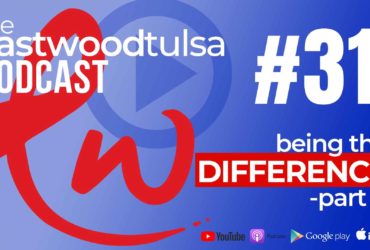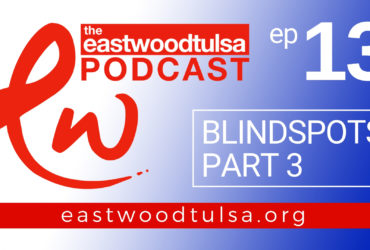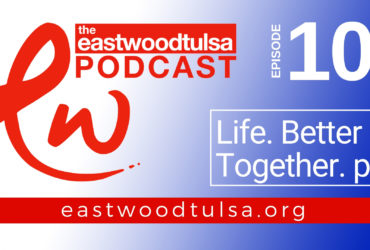
“When we judge others, we set in motion how we will be judged.” Blind spots can cause us to judge others. We all have blind spots. How do we deal with them? Pastor Gordon and Jeremy give some great answers in this episode.
Episode #11: Blind Spots
A Just Judge
Welcome to the Eastwood Tulsa Podcast with Jeremy Rhodes and Pastor Gordon Small. Every week, we take our Sunday message, or maybe another topic altogether, and talk about it in a relaxed setting. And hopefully help you take the truths from Sunday, and bring them alive on Mondays—and every other day, too. So thanks for joining us!
If you missed Sunday’s message, “Blind Spots“, you can watch it here.
We Can’t See It
A blind spot is something hindering what is otherwise visible. It’s there but we don’t see it! What are some blind spots that can afflict us? Being judgmental, hypocrisy, selfishness, bitterness, religiosity, bias, lack of knowledge, pride, routine, inflexibility, negativity, prejudice, tone of voice, mannerisms. We talk about the “elephant in the room.” A blind spot might be called the elephant in your life.
Blind spots in a car can cause accidents. Blind spots in our lives can cause problems with other people because we don’t know how we come across to others. Sin is the cause of those blind spots. Some of them are very serious.
Can I Weed Your Garden?
Pastor Gordon shares an amusing illustration of blind spots:
“I had a small garden in our yard with hot pepper plants and tomatoes. It was constantly needing attention. The weeds would take over if I didn’t pull them out. Other neighbors had gardens too. I noticed that the neighbors never offered to weed my garden! And I never weeded theirs. We had enough work of our own.
Spiritually speaking when we are constantly pointing out the faults of others we are essentially saying, ‘Let me weed your garden’, your life needs attention. Jesus had something to say about that.”
“Judge not, that you be not judged. For with what judgment you judge, you will be judged; and with the measure you use, it will be measured back to you. And why do you look at the speck in your brother’s eye, but do not consider the plank in your own eye? Or how can you say to your brother, ‘Let me remove the speck from your eye’; and look, a plank is in your own eye? Hypocrite! First remove the plank from your own eye, and then you will see clearly to remove the speck from your brother’s eye.” Matthew 7:1–5 (NKJV)
Check Your Own Spiritual Temperature
The key word in that passage is the “with the judgement you judge”, and “the measure you use”. We can be really over the top in judging other people. If we are, God’s going to be really over the top in the way we are judged as well. We would just assume not be there. Before we go around plucking specks out of other people’s eyes we should check our own spiritual temperature.
Don’t Excuse Bad Behavior
We have all been put into a position to judge, i.e. pick a side. We hear all kinds of things about people, situations and we’re constantly having to make a judgment call. We can’t take this passage and then excuse bad behavior and say, ‘you can’t judge because adultery, or fornication., or drunkenness, or some obvious sin or behavior, you can’t white wash it and say you can’t judge me, I can be however I want to be.’
Once we say there’s morality, right and wrong, we’re setting ourselves up for the exact same kind of judgment that we meet out. According to Jesus, your desire to pull the speck out can’t be done because you can’t see because you have a much bigger problem yourself.
Giving, Forgiving, and Judging
One of the key phrases is that you be not judged. It’s not that we may not have a valid judgment of others; we may be right. That said, as soon as we judge we set in motion our own judgment.
A lot of judgment, biblically speaking, is future. “Some men’s sins are open beforehand, going before to judgment; and some men they follow after.” I Timothy 5:24 (KJV). In other words, sometimes you receive judgment right away and sometimes it’s postponed because God is merciful. It’s not that it’s not meriting immediate judgement but we don’t always get immediate judgment. A lot of people break the law, speeding for example, but not everybody gets pulled over. Judgment is postponed. We set in motion our own judgment as coming judgment whether it’s immediate or down the road.
We see in Luke 6:37-38 the issue of giving, forgiving and judging. Those three areas we will receive – it’s sort of a “reap what you sow”. The way we give is the way we receive from God. So that we can see our own behavior. God wants us to see what we really are like because we can’t see it for ourselves. So, He shows it to us in giving, forgiving, and judging.
“Judge not, and you shall not be judged. Condemn not, and you shall not be condemned. Forgive, and you will be forgiven. Give, and it will be given to you: good measure, pressed down, shaken together, and running over will be put into your bosom. For with the same measure that you use, it will be measured back to you.” Luke 6:37-38
Forgiving is a hard statement because He says if we forgive, we will not be forgiven. We don’t understand the grace and the love and the mercy of God which is overarching in this judging and forgiving. If we don’t understand God’s grace and He continues to give us grace, or we don’t forgive and He continues to forgive us then we won’t really grow or learn anything. We think we’re right.
A Just Judge
God is not asking us to be the judge. He is the judge. The point of His coming is to save us not to condemn. That is the message of the gospel. The message of the church.
Judgment is coming. There is an accounting. No one gets away with anything. We don’t have the facts.
Love Never Fails
We can’t hide behind Matthew 7:1-5 and not accept an honest judgment of our behavior. If someone tries to correct us in love, we better listen.
Our mission is to love, not judge. Wherever you are walking; maybe you feel judged, a flaw, something in your past, there is freedom! The cure for blind spots is repentance/revelation.
We pray that God will reveal how He sees your situation.
Next time:
Going deeper into Blind Spots
Questions? Comments? Share in the comments below.










